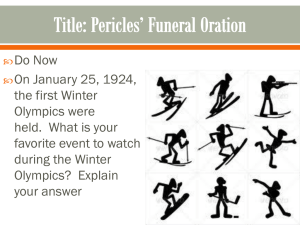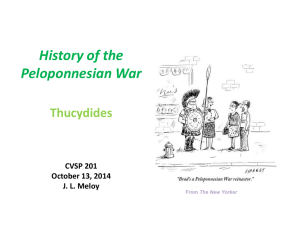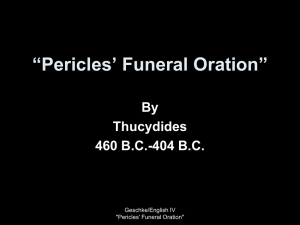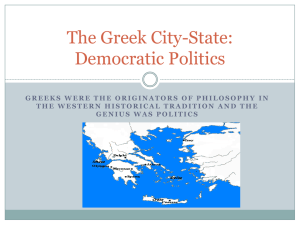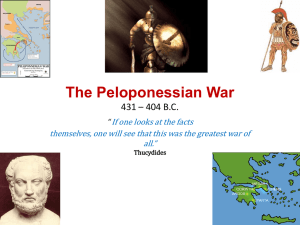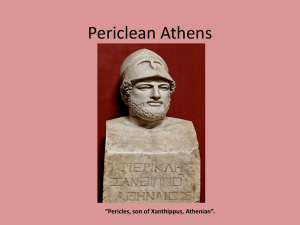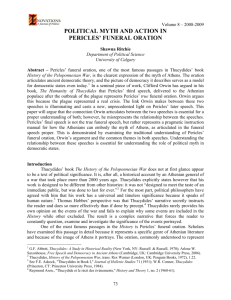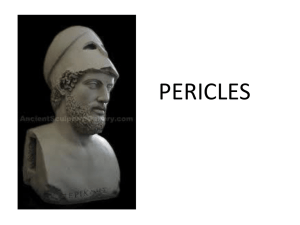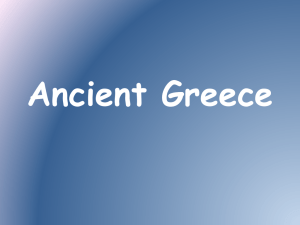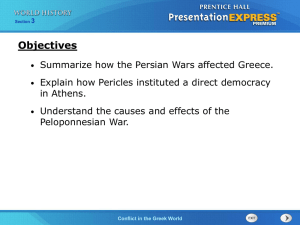File
advertisement
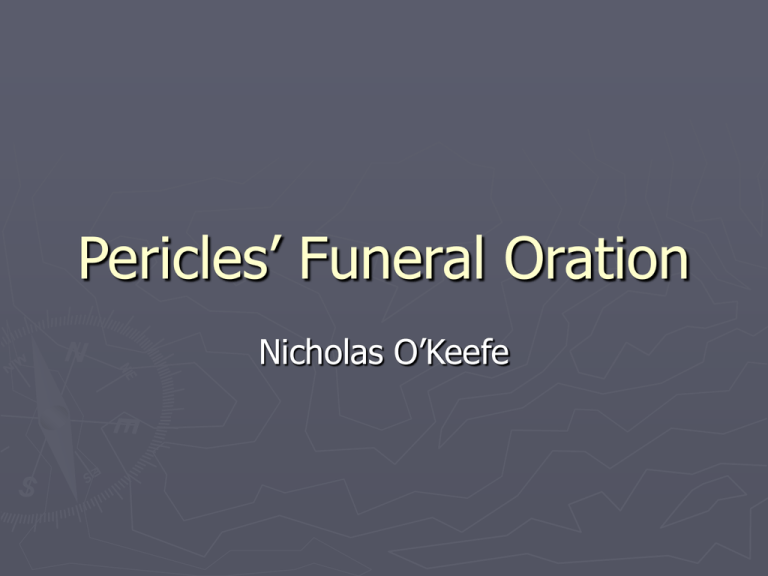
Pericles’ Funeral Oration Nicholas O’Keefe 'The Age of Pericles' painted by Philipp von Foltz - 1853. ► Pericles' Funeral Oration was transcribed by Thucydides as part of his record of the Peloponnesian War written in the later part of 400s BCE Thucydides ► ► ► Thucydides was born around the year 455 BCE He was a Greek political and military figure but is best known for his account of the Peloponnesian War Died around 400 BCE ► ► After being blamed for a failed protection of Amphipolis during the war he was tried and condemned to death in Athens and was forced to flee. His exile allowed him to obtain a unique perspective for his writings as he was able to write using information from his own experiences as well as records from other Peloponnesian allies and rivals. His record was able to chronicle parts of the war from both sides. Oxyrhynchus Papyri ► ► While many translations still survive no complete original manuscript still exists. However, a part of the manuscript was found on a Papyrus scroll by B. P. Grenfell and A. S. Hunt They would publish this part in a collection with many other manuscripts found in the same location called the Oxyrhynchus Papyri. Currently P.Oxy 17 the papyrus scroll featuring the excerpt from Thucydides manuscript is located at the John Hopkins University. ► The Funeral Oration of Pericles is important for a few reasons… "They alone in the world deliver funeral orations for citizens who have died for their country.“ The record of a funeral oration itself is important because the Greeks were the inventors of public eulogies for fallen citizens. Pericles oration is an account of something that is truly Greek in nature and shows Greek practices. "They faced death and fled from disgrace" ► The men who died that day are heroic because they weighed the choices they had and still decided an honorable death was more preferable than any other option. This shows the values of Greek soldiers at the time put the lives of the Greek people above their own, and were willing to sacrifice themselves to protect Greek traditions. ► Is the account of the Oration True? Ioannis Kakridis Greek Historian of the early 20th century Argued that the oration recorded was not Pericles' speech but a speech from Thucydides to his own readers of the time after the war. ► The oration seems to be addressed to "a humble, incredulous and envious generation, who doubted not only the wisdom of Pericles' imperial policy but the value of Athenian civilization itself as it had been created by men of an earlier age." ► Such an address would not have been needed on a battle field filled with soldiers fighting for their people. ► The speech if it were actually by Pericles' seems to assume that a portion of the audience would "begrudge" the dead the praise they deserve. Something that would be much more common to find among citizens who were not actually there. ► ► Arnold Wycombe Gomme Arnold Wycombe Gomme ► ► ► ► ► Greek Historian that came along after Kakridis around the mid 20th century Gomme argues against Kakridis theory on one main point. Greeks has a traditon in writing an speaking especially men such as Pericles to cover all grounds in generalizations when presenting something to an audience. No matter who made up the audience they wanted to speak to all of them in a way they could understand and embrace. Many other scholars agree that while with Gomme that Thucydides may have been responsible for the speech. However, he is only responsible for writing it the lines are very much something of Pericles‘. So while they may have been skewed slightly by the Thucydides while transcribing them they are still an accurate portrayal of what the speech entailed. Conclusion ► ► ► ► I agree with Gomme and others that believe the oration to be a combination of Pericles and Thucydides. Pericles' Ideals and Thucydides coincide. While Thucydides may have taken some artistic liberties with the oration of Pericles, from the information he gathered and his own experiences with Pericles he crafted a speech that would very much be of the type Pericles would have given. The oration while addressing the audience present at the speech was a chance for Thucydides to show the ideals of Pericles and the soldiers who had fought in the Peloponnesian War to the current population. The Funeral oration whether it is Pericles’ or Thucydides’ creation is still an important account of the Greek way of life and death on the battlefield Bibliography ► ► ► ► ► ► ► Else, Gerald F. "Some Implications of Pericles' Funeral Speech." The Classical Journal 49.4 (1954): 153-56. JSTOR. Web. 3 Nov. 2011. <http://www.jstor.org/stable/3293838>. Grenfall, B.P., and A.S. Hunt. "The Oxyrhynchus Papyri." The Oxyrhynchus Papyri. Internet Archive: Digital Library of Free Books, Movies, Music & Wayback Machine. Web. 30 Oct. 2011. <http://www.archive.org/stream/oxyrhynchuspapyr01grenuoft>. Holmes, David H. "The Funeral Oration of Pericles." The New York Latin Leaflet 1.25 (1901): 3-4. JSTOR. Web. 01 Nov. 2011. <http://www.jstor.org/stable/40405161>. Pearson, Lionel. "Three Notes on the Funeral Oration of Pericles." The American Journal of Philology 64.4 (1943): 399-407. JSTOR. Web. 7 Nov. 2011. <http://www.jstor.org/stable/291629>. Sicking, C.M. J. "The General Purport of Pericles' Funeral Oration and Last Speech." Hermes 4th ser. 123.H (1995): 404-25. JSTOR. Web. 6 Nov. 2011. <http://www.jstor.org/stable/4477104>. Stow, Simon. "Pericles at Gettysburg and Ground Zero: Tragedy, Patriotism, and Public Mourning." The American Political Science Review 101.2 (2007): 195-208. JSTOR. Web. 12 Nov. 2011. <http://www.jstor.org/stable/27644440>. "Thucydides." Ancient Greece - History, Mythology, Art, War, Culture, Society, and Architecture. University Press Inc, 2008. Web. 03 Nov. 2011. <http://www.ancientgreece.com/s/People/Thucydides/>. Image Bibliography ► http://www.hri.org/por/thucydides.html ► http://www.ancientgreece.com/s/People/Th ucydides/ ► http://www.archive.org/stream/oxyrhynchus papyr01grenuoft#page/44/mode/2up
